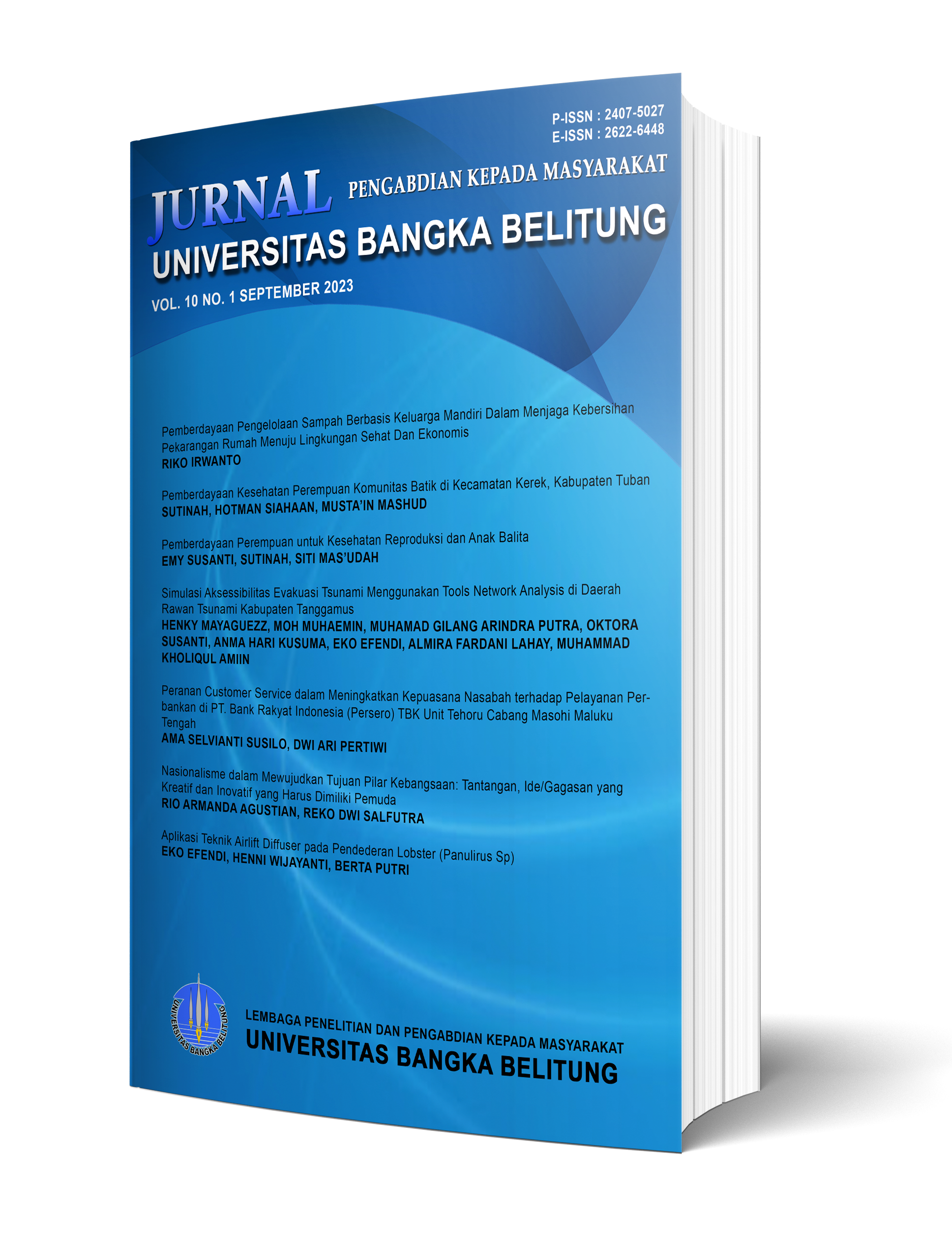Women's Empowerment For Reproductive Health And Toddlers
Pemberdayaan Perempuan untuk Kesehatan Reproduksi dan Anak Balita
Abstract
The health of women and children is one of the crucial issues in achieving health development throughout the world. All of these problems must be solved immediately, mainly through community service activities by implementing science and technology that have been produced by the Team's research in recent years for the community in Wringinanom District, Gresik Regency. The purpose of this activity and the target of community service activities is to provide the following solutions; 1) provide independent registration assistance related to women's and children's reproductive health; 2) strengthening women's networks through information technology; 3) Empower PKK Health Cadres. This community service is carried out from preparation, implementation, monitoring and evaluation. The data collection method was carried out by holding a pretest and posttest. This study shows that reproductive health is not just a medical problem, but also a social and cultural problem. Not because women are guilty for not understanding and not caring about their own health conditions, but more related to their insensitive access to the situation faced by women. Therefore, joint efforts are needed to increase women's knowledge related to reproductive health and children under five to achieve the third Sustainable Development Goals, namely a healthy and prosperous life.
Downloads
References
Syafrudin dan Hamidah, 2009. Syafrudin dan Hamidah, 2009. Kebidanan Komunitas. Jakarta: EGC.
Lopes, Sofia Castro., Constant, Deborah., Fraga, Silvia., & Harries, Jane. (2022). How Women’s Empowerment Influences Fertility-Related Outcomes and Contraceptive Practices: A Cross-Sectional Study in Mozambique. PLOS Glob Public Health Vol 2.9. https://doi.org/10.1371/journal.pgph.0000670.
Atake, Esso-Hanam., & Ali, Pitaloumani Gnakou. (2019). Women’s Empowerment and Fertility Preferences in High Fertility Countries in Sub-Saharan Africa. BMC Women’s Health Vol 19.54. https://doi.org/10.1186/s12905-019-0747-9.
Kemenkes RI, 2014, Situasi Kesehatan Ibu. Infodatin. Jakarta : Kementerian Kesehatan Republik Indonesia.
Buckley, Lynn., Gibson, Louise., Curtin, Margaret, Hardord, Katherine., & Cornally, Nicola. (2022). Community PPaediatric Clinics and Theor Role in Supporting Developmental Outcomes and Sevices for Children Living in Disadvantaged Communities. Journal of Child Health Care.
https://doi.org/10.1177/1367493522114600.
Prijatni, I., & Rahayu, S. (2017). Modul Bahan Ajar Cetak Kebidanan: Kesehatan Reproduksi dan Keluarga Berencana. Badan Pengembangan dan Pemberdayaan Sumber Daya Manusia. Kementerian Kesehatan RI.
Wijayanti, U.T. & Nurpratama, P,Y,A., (2020). Gambaran Kesehatan Reproduksi Remaja. BKKBN Jawa Tengah. [Diakses pada 30 Maret 2022].
https://jateng.bkkbn.go.id/?p=1551Kominfo. 2020. Pahami dan Rencanakan Kesehatan Reproduksi dengan Nyaman. [Diakses 30 Maret 2020]. https://kominfo.go.id/content/detail/32188/pahami-dan-rencanakan-kesehatan-reproduksi-dengan-nyaman/0/artikel_gpr.
Rahayu, F., Sukarno. (2019). Hubungan Pengetahuan Kesehatan Reproduksi, Keikutsertaan Remaja dalam Pusat Informasi Konseling Remaja (PIK-R) dan Penggunaan Napza dengan Perilaku Seks Pranikah Remaja di Indonesia. Jurnal Keluarga Berencana 4(1). https://doi.org/10.37306/kkb.v4i1.6.
Cahyani, K,O,A., Agushybaha, F., & Nugroho, R,D,N. (2021). Hubungan Pola Komunikasi Orang Tua Asuh dengan Pengetahuan dan Sikap kesehatan Reproduksi Remaja Panti Asuhan Kabupaten Klaten Tahun 2020. Jurnal Kesehatan Reproduksi 12(2). https://doi.org/10.22435/kespro.v12i1.4432.
Copyright (c) 2023 emy susanti, Sutinah Sutinah, Siti Mas'udah

This work is licensed under a Creative Commons Attribution-NonCommercial 4.0 International License.








